|
|
|
Sort Order |
|
|
|
Items / Page
|
|
|
|
|
|
|
| Srl | Item |
| 1 |
ID:
153611
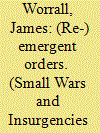

|
|
|
|
|
| Summary/Abstract |
The concept of order is often neglected in the study of conflict – seemingly such a ‘disordering’ process. With the recent increase in the examination of rebel governance however, bringing order back into our understanding of rebel and insurgent groups has much to offer in exploring the everyday politics which connect authorities, rebel movements and the population itself, in a complex mass of intersubjective and power-based interactions and negotiations. Rebels both shape and are shaped by existing forms of order in complex and ongoing ways. This article explores how varying elements interact in the negotiation, framing and enforcement of order and develops an original analytical framework to examine the perpetual negotiations of rebel movements in their attempts to cement their control.
|
|
|
|
|
|
|
|
|
|
|
|
|
|
|
|
| 2 |
ID:
134144
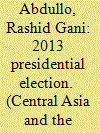

|
|
|
|
|
| Publication |
2014.
|
| Summary/Abstract |
The author looks at the problem of the legitimacy of the 2013 presidential election in Tajikistan as a sine qua non of social and political stability and, consequently, of the country's security and territorial integrity. In Tajikistan's specific case, the election could only be legitimate if the opposition forces, primarily the Islamic Revival Party of Tajikistan (IRP), which comes second after the institution of presidential power as the most influential political force, did not boycott it.
Despite the easily predicted results (another term for President Rakhmon), the IRP leaders decided to take part in the process: an Islamic revival could only take place in a politically stable Tajikistan. To gain public legitimacy for their decision, they organized a series of consultations with representatives of the public to formulate and realize the idea of an Alliance of the Reformist Forces of Tajikistan (ORST), which nominated human rights activist Oinihol Bobonazarova as its joint presidential candidate. She did not run because, after failing to present the necessary number of signatures gathered in her support to the Central Election Commission, she was not registered as a candidate. The IRP leaders abstained from voting, but denied all accusations of boycotting the election.
President Rakhmon, who won the election, and the IRP, which stuck resolutely to its course and was able to keep the Islamic revival going, were both winners. The country benefited the most-the election did not shake the frail stability, while Tajikistan's enemies lost another chance to interfere in its domestic affairs with destructive intentions.
|
|
|
|
|
|
|
|
|
|
|
|
|
|
|
|
| 3 |
ID:
113824
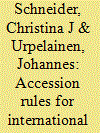

|
|
|
|
|
| Publication |
2012.
|
| Summary/Abstract |
Powerful states often accept unanimity voting on accession to international institutions, even though this enables weak states to blackmail powerful states into providing costly side payments. Whereas the literature attributes this choice mainly to efforts to bolster the legitimacy of international institutions, the authors demonstrate that the choice of unanimity also has a strategic component. The authors formally show that unanimous accession rules can profit powerful states by creating uncertainty as to the minimal level of reform that enables accession. If accession is valuable enough and the membership candidate is uncertain about the resolve of weak states, it plays safe by implementing ambitious reforms that improve the efficacy of the international institution. In this case, a legitimacy-efficacy trade-off does not exist: the unanimity rule enhances legitimacy while allowing powerful states to induce significant reforms by applicants to the benefit of current members.
|
|
|
|
|
|
|
|
|
|
|
|
|
|
|
|
| 4 |
ID:
118204


|
|
|
| 5 |
ID:
173909
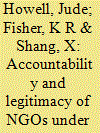

|
|
|
|
|
| Summary/Abstract |
How non-governmental organisations (NGOs) craft accountability and legitimacy in authoritarian states is poorly understood. We put forward a framework of analysis for capturing the processes of making accountability and legitimacy. We introduce the ideas of first- and second-order accountability and stocks of accountability capital. In authoritarian regimes, building second-order accountability through the accumulation of stocks of accountability is crucial for NGOs’ survival and organisational development and as a path towards gaining first-order accountability. Drawing on a decade of fieldwork on child welfare NGOs in China from 2007 to 2017, we select three case studies with long operational trajectories to illustrate processes of crafting legitimacy and accountability. The research contributes empirically and theoretically to the understanding of accountability in NGOs in authoritarian states through the novel analytic framework and case study of China.
|
|
|
|
|
|
|
|
|
|
|
|
|
|
|
|
| 6 |
ID:
113734
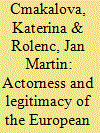

|
|
|
|
|
| Publication |
2012.
|
| Summary/Abstract |
The article surveys the current state of the academic debate about actorness and legitimacy of the European Union. It investigates various kinds of EU's actorness, as well as concepts and categories of its legitimacy, and attempts to trace their relationships, which remains an underdeveloped aspect of the discussion. We examine a wide range of scholarly articles, books and other academic sources in assessing the quality and fairness of the respective discussions and suggest that, within the current mostly normative debate, a positive evaluation of the EU's legitimacy is unattainable and that it is necessary to acquire a fairer notion of what kind of international actor the Union is.
|
|
|
|
|
|
|
|
|
|
|
|
|
|
|
|
| 7 |
ID:
089845
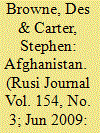

|
|
|
|
|
| Publication |
2009.
|
| Summary/Abstract |
The political questions in Afghanistan are difficult and complex. While the new US approach has much to be commended, there is still cause for alarm. Legitimacy and governance remain a massive challenge. Elections are a vital next step-but many doubt the credibility of the coming vote. Effective institution-building is threatened by an incoherent approach that does not grapple with the key issues, which are ultimately political.
|
|
|
|
|
|
|
|
|
|
|
|
|
|
|
|
| 8 |
ID:
172844
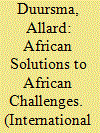

|
|
|
|
|
| Summary/Abstract |
The current scholarly literature on the international mediation of civil wars draws predominantly on a rationalist-materialist perspective. This perspective suggests that the ticket to mediation success is the material manipulation of the bargaining environment by third parties with a high degree of economic and military resources. I argue that legitimacy also determines outcomes of mediation because if a mediator has legitimacy, it can continue to look for a mutually satisfactory outcome and try to pull the conflict parties toward compliance. I show that legitimacy matters by systematically comparing the effectiveness of African and non-African third parties. African third parties are typically considered ineffective because of a low degree of economic and military capacity. However, they effectively mediate civil wars in Africa because of a high degree of legitimacy, which is a result of a strong conviction within the African society of states that African mediation is the most desirable type in conflicts there. Drawing on data from the Uppsala Conflict Data Program supplemented with unique data, which together cover all mediation efforts in Africa between 1960 and 2017, I find quantitative evidence supporting the effectiveness of African third parties. Compared to non-African ones, African third parties are far more likely to conclude negotiated settlements that are more likely to be durable. African third parties are especially effective if the conflict parties are highly committed to the African solutions norm. Theoretically, this study deviates from much of the literature that puts forward solely rationalist-materialist explanations of mediation success. By bringing legitimacy to the forefront, this article supplements the current mediation literature that emphasizes material sources of power and ignores social structures.
|
|
|
|
|
|
|
|
|
|
|
|
|
|
|
|
| 9 |
ID:
130866


|
|
|
|
|
| Publication |
2014.
|
| Summary/Abstract |
Curbing corruption is vital for China's future. But the exposure of corruption cases can only damage public confidence in the CCP and the state more generally. Corruption associated with toxic food, bogus medicines, grave abuses of power and criminal 'black societies' has produced a series of public scandals in China. Without reform, further occurrences could rapidly erode the legitimacy not just of the police and other judicial organs, but also of the ruling Chinese Communist Party (CCP). The recent trial of Bo Xilai, the former Chongqing party secretary and member of the party's elite 25-member Politburo, showcased the kind of corruption that China's past president Hu Jintao warned could lead to 'the collapse of the Party and the downfall of the state'. In 2011, the Bank of China inadvertently reported that between 1994-2008 as many as 18,000 corrupt officials had fled the country for destinations in Europe, America and other parts of Asia, plundering an estimated $120 billion from state-owned enterprises and other criminal activities. The costs of maintaining domestic public order have also grown rapidly, and, for the first time, domestic security outlays approved by the 2012 National People's Congress (NPC) exceeded defence, in part over concerns about the growth of mass protests, fraud, corruption and organised crime, and the need to strengthen weiwen (stability) and social harmony.
|
|
|
|
|
|
|
|
|
|
|
|
|
|
|
|
| 10 |
ID:
071100
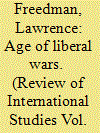

|
|
|
| 11 |
ID:
197127


|
|
|
|
|
| Summary/Abstract |
AI-enabled systems are likely to inform future decisions to initiate war. They are well placed to manage data and deliver recommendations at speeds that far surpass human abilities. Yet, AI-enabled vision and knowledge, which inform military intelligence, surveillance, and reconnaissance practices, curiously sustain both exposure and opacity. Machine learning algorithms are famously called black boxes even as they are in practice widening what we can see and know. While many call for greater algorithmic transparency to combat this technological opacity, I argue that this desire is misguided because it overlooks how algorithmic reason, which promises more precise knowledge and more efficient decision making, naturally conceals through political and socio-technical practices of in-visibility, anonymity, and fragmentation. Given how these practices will likely come to shape AI-enabled resort-to-force decision making, this article concludes with the suggestion that AI-enabled decisions are likely to undermine democratic legitimacy.
|
|
|
|
|
|
|
|
|
|
|
|
|
|
|
|
| 12 |
ID:
153617
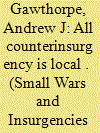

|
|
|
|
|
| Summary/Abstract |
Although the concept of legitimacy is central to Western counterinsurgency theory, most discourse in this area black-boxes the concept. It hence remains under-specified in many discussions of counterinsurgency. Fortunately, recent research on rebel governance and legitimacy contributes to our understanding of the problems faced by counterinsurgents who want to boost state legitimacy while undermining that of the rebels. Taken together, this research illustrates that a rational choice approach to legitimacy is simplistic; that micro-level factors ultimately drive legitimacy dynamics; and that both cooption of existing legitimate local elites and their replacement from the top–down is unlikely to succeed. Western counterinsurgency doctrine has failed to grasp the difficulties this poses for it.
|
|
|
|
|
|
|
|
|
|
|
|
|
|
|
|
| 13 |
ID:
145565
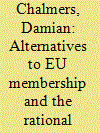

|
|
|
|
|
| Summary/Abstract |
The domestic scenario following a Brexit vote is likely to be characterised by high stakes, uncertainty and fissile political debate. No off-the-peg arrangement touted for Brexit—be it Norwegian, Swiss, Turkish or Canadian—was designed to engage with such a context. Nor does it seem wise to rush to medium-term commitments which might pre-empt democratic politics and wise choices. Far more important will be the legitimacy of any institutional settlement governing this arrangement, which will provide the context for its revision and development and the space for democratic reflection over how these policies are to be governed. It will be suggested that here there is much insight to be gained from looking at regional arrangements beyond the EU.
|
|
|
|
|
|
|
|
|
|
|
|
|
|
|
|
| 14 |
ID:
077890


|
|
|
|
|
| Publication |
2007.
|
| Summary/Abstract |
The Kyoto Protocol has been ratified by 164 states and is now fully operational. However, the Bush administration's repudiation of the Protocol combined with the weakness of the targets raise a confronting question for students of legitimacy: is it possible for a regime to be legitimate but ineffective in solving the problem it is designed to address? I argue that effectiveness is an important component of the Protocol's legitimacy but that the parties have been reluctant to make an issue of effectiveness during the early phase of the Protocol's operation. However, the legitimacy of the Protocol is likely to wane, and the chronic international legitimacy crisis of the Bush administration's climate change policy is likely to become acute, as a result of poor performance. I conclude by suggesting what might constitute significant and timely adaptation that might resolve the US's chronic legitimacy crisis and the Protocol's waning legitimacy
|
|
|
|
|
|
|
|
|
|
|
|
|
|
|
|
| 15 |
ID:
173227
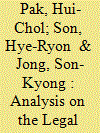

|
|
|
|
|
| Summary/Abstract |
At present, some states are undertaking military interventions in different parts of the world, contending the ‘legitimacy’ of their i006Evocation of responsibility to protect civilians from a humanitarian crisis. Discussions at international forums concerning the concept of Responsibility to Protect (R2P) are inconclusive about its legal nature and application. While some scholars and states support the doctrine of R2P as being legitimate, others challenge or take a rather sceptical view. Divergent views seem to be originating from its incompatibilities with the rules of international law, including the Charter of the United Nations. What is controversial is that the supporters of R2P are mainly from the West, while objections to R2P are from developing countries mainly from West Asia or Africa. This raises concerns about the possibility of future applications of R2P in any of the countries in these regions or other developing countries. The article, analyses the legal nature of R2P in terms of the main principles of international law and other sources of international law and argues that the legitimacy and international legal effect of R2P are uncertain.
|
|
|
|
|
|
|
|
|
|
|
|
|
|
|
|
| 16 |
ID:
168509


|
|
|
|
|
| Summary/Abstract |
Since it was founded in 1967, the Association of Southeast Asian Nations (ASEAN) has attracted both sceptics and proponents. With Southeast Asia’s economy growing rapidly and tied into all parts of the global economy and the region geopolitically important to the world’s major powers, how ASEAN manages its internal affairs and East Asian relations is crucial. The differences in how sceptics and proponents perceive ASEAN, and why they take up such contrasting positions, need to be fully appreciated as scholars and commentators review and assess ASEAN’s performance. This analysis uses three analytical criteria – effectiveness, legitimacy and efficiency – to juxtapose and evaluate the competing arguments of the two approaches so as to better understand how and why sceptics and proponents can examine the same institutions and events and reach very different conclusions.
|
|
|
|
|
|
|
|
|
|
|
|
|
|
|
|
| 17 |
ID:
066780
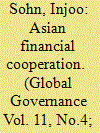

|
|
|
| 18 |
ID:
133600
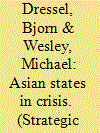

|
|
|
|
|
| Publication |
2014.
|
| Summary/Abstract |
Problems common to many Asian states suggest a pattern of crisis in Asia. The evidence suggests that the root cause is the similarity in the patterns of political development of postcolonial states. In Asia such states have attempted to reconcile state strength and internal diversity by constructing a triangular balance between identity construction, hegemonic governance and economic development. Unfortunately, this fragile balance eroded as state structures matured and economies grew, which increasingly exposed countries to escalating crises of legitimacy and instability. By highlighting changes in the postcolonial state compact within the region, this article seeks to advance both the understanding among theorists of political developments in the region and the understanding among those who govern of the roots of the current crisis.
|
|
|
|
|
|
|
|
|
|
|
|
|
|
|
|
| 19 |
ID:
145138
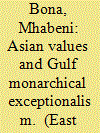

|
|
|
|
|
| Summary/Abstract |
Political elites in both the Arab Gulf and Asia have, in recent history, cultivated narratives that seek to legitimize their respective alternatives to the Western liberal-democratic model of government. In the Gulf Arab countries, this has involved highlighting the benevolence of the state through national myths of monarchical exceptionalism, while ruling elites on the Eastern side of the continent have employed the Asian values hypothesis to great effect. In both regions, exceptionalist discourses have boosted elite legitimacy in the aftermath of the Cold War – often by co-opting subaltern themes from postcolonial discourses. This study posits that the similarities between the two regional discourses are significant and that the potential is high for a future ideological convergence between them. Through its analysis of the Asia-Middle East Dialogue (AMED) – a 2004 Singaporean initiative to foster greater interregional dialogue between Eastern and Western Asia – it identifies three discursive frames that mark the existing discourse between elites on the Eastern and Western ends of the Asian continent. Focusing on the implications that these three frames would have if further adopted in Gulf Arab elite discourse, it suggests that the opportunity for discursive synergies is high as the Gulf Arab states continue to “Asianize” in the coming years.
|
|
|
|
|
|
|
|
|
|
|
|
|
|
|
|
| 20 |
ID:
160422
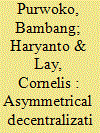

|
|
|
|
|
| Summary/Abstract |
This article discusses the questions of representativeness and legitimacy within the context of the Majelis Rakyat Papua (Papuan People’s Assembly) as an integral part of the Indonesian government’s asymmetrical-decentralization scheme to reduce separatist tendencies in Papua. We find that the MRP has generally failed in its representation and its claim to legitimacy.
|
|
|
|
|
|
|
|
|
|
|
|
|
|
|
|
|
|
|
|
|